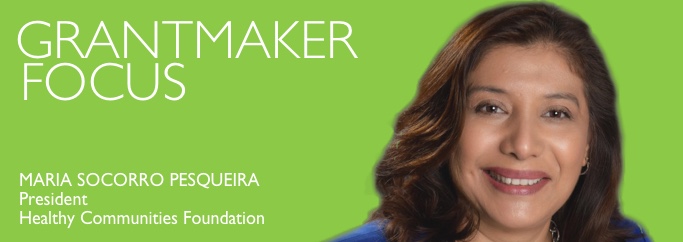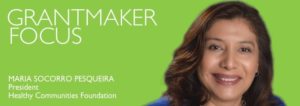
Address: 19 Riverside Road, Suite 6, Riverside, IL 60546
Phone: 708.443.5696
Email: administration@hcfdn.org
Web: www.hcfdn.org
The Healthy Communities Foundation (HCF) is a health conversion foundation from the sale of MacNeal Hospital, located in Berwyn, Illinois, to the Vanguard Health Services in 1999. The proceeds from the sale provided an endowment that allowed HCF to make grants in the MacNeal Hospital service area since 2000. In 2017, the Foundation was renamed from Arthur Foundation to the Healthy Communities Foundation. In addition to funding HCF’s legacy service area, the foundation has a renewed focus on achieving health equity by investing the majority of funds in zip codes that rank the lowest in its social determinants of health study.
HCF is a community-informed grantmaking foundation that seeks to measurably improve the health and well-being of individuals, families, and communities in its service area by promoting health equity, quality, and access. The Foundation envisions that all residents of its communities lead full, healthy, and happy lives, and enjoy equal life expectancy. It believes that all community residents, particularly those who live with the greatest disparities, should have access to resources and opportunities that improve their well-being and create a sustainable quality of life. HCF recognizes systemic conditions, such as implicit bias and institutional and structural racism, impede those goals and disproportionately affect people of color and ethnic minorities. It commits to investing in community-led collaboratives and programs, policy advocacy, and research projects that shape data and community-informed grantmaking.
HCF’s service area includes 27 zip codes in the Chicago and suburban municipalities of western Cook County, Illinois. It comprises approximately 900,000 residents, roughly a third of the Chicago. Health needs vary among racial/ethnic groups based on their different social and economic profiles. The HCF Legacy & Equity Zone has higher levels of socioeconomic need: 32 percent of residents have incomes below 150 percent of the poverty level (versus 23 percent in Illinois and United States); 23 percent of people lack a HS degree (versus 12 percent in Illinois, 13 percent in United States); 1 in 6 residents lack health insurance; and 25 percent of the service area’s population is enrolled in Medicaid (Paral et all 2018).
Program Information:
By using health equity as an overarching principle and lens, HCF funds organizations that demonstrate alignment with at least one of the following funding categories, all of which comprise its grantmaking framework:
- Access to quality health care: Strategies that expand access to high quality and comprehensive health care with a focus on residents who live with the greatest health disparities.
- Address social determinants of health: Strategies that address non-medical factors that influence health outcomes.
- Advocate for health-related policies and systems change: Strategies that impact existing structures and policies that drive to the root cause of inequalities.
- Augment knowledge through capacity building: Efforts that contribute to community-driven and/or community-specific data collection, research, and analysis regarding local health.
Financial Information:
Total Assets: $134,152,380 FY17
Amount Dedicated to Health-Related Grants: $5,053,601
- Special Initiatives and/or Representative Health and Human Services Grants:
Community Health Worker (CHW) Pilot Initiative—The CHW pilot, funded in partnership with Community Memorial Foundation (CMF), a health conversion foundation, and coordinated by Health and Medicine Policy Research Group, seeks to address the ongoing local need to increase awareness of health and human service resources and connect people to needed services within the HCF and CMF service areas. Community Health Workers are frontline public health workers who are trusted members and/or have an unusually close understanding of the community served. ($235,000)Illinois Coalition for Immigrant and Refugee Rights Health Access Initiative—This initiative builds capacity among health and social service providers by training staff on immigrant issues, helping organizations create more welcoming environments, and training communities on how to enroll participants into the Cook County Direct Access Program. These efforts expand access to care for uninsured individuals and improve health literacy and knowledge of resources available to immigrant communities. ($125,000)
BUILD, Inc.—In response to high rates of community violence and poor health outcomes experienced by residents in the Austin community, BUILD’s gang intervention team has doubled in size to support clinical services, violence prevention, and health navigation. ($75,000)
Inner-City Muslim Action Network (IMAN)—IMAN serves a diverse population of all ages, regardless of ability to pay and provides comprehensive, culturally competent quality primary health care, behavioral health, and oral health services. ($165,000)
MacNeal Hospital – Medical Respite Program for the Homeless—The program offers post-acute short-term residential units to homeless users of the ER to allow for safe recovery, facilitate connections to needed medical and social services and decrease hospital use. ($25,000)
Most Pressing Health Issues in the Community You Serve
“Our goal is to ensure that every resident in our service area has the resources and opportunities to live a full healthy and happy life, regardless of income, where they live or their racial and ethnic background.”
Maria Socorro Pesqueira, President
References
A Profile of Communities and Change: The Service Area of the Healthy Communities Foundation, Rob Paral and Associates, September 2018, https://hcfdn.org/research-data/

